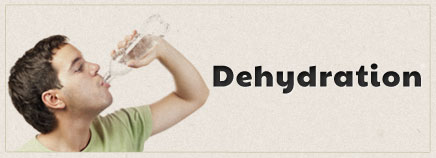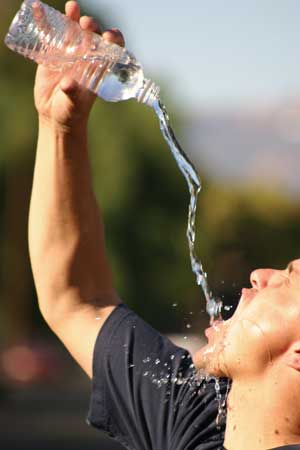
As We All Know The Most Common Health Problem In Summers Is Dehydration. So Here Is A Full Description About It With All The Answers To Your Questions.
Dehydration Means Your Body Does Not Have As Much Water And Fluids As It Should. Dehydration Can Be Mild, Moderate, Or Severe Based On How Much Of The Body’s Fluid Is Lost Or Not Replenished. When It Is Severe, Dehydration Is A Life-Threatening Emergency.
Causes, Incidence, And Risk Factors:
Dehydration Can Be Caused By Losing Too Much Fluid, Not Drinking Enough Water Or Fluids, Or Both.Your Body May Lose Too Much Fluids From:
• Excessive Sweating (For Example, From Excessive Exercise)
• Excessive Urine Output, Such As With Uncontrolled Diabetes Or Diuretic Use
• Fever
• Vomiting Or Diarrhea
Symptoms:
• Dry Or Sticky Mouth
• Lethargy Or Coma (With Severe Dehydration)
• Low Or No Urine Output; Urine Looks Dark Yellow
• No Tears
• Sunken Eyes
• Sunken Fontanelles (The Soft Spot On The Top Of The Head) In An Infant
You May Also Have Vomiting, Diarrhea, Or The Feeling That You “Can’t Keep Anything Down.” All Of These Can Be Causing The Dehydration.

Treatment:
Drinking Fluids Is Usually Enough For Mild Dehydration. It Is Better To Drink Small Amounts Of Fluid Often (Using A Teaspoon Or Syringe For An Infant Or Child), Instead Of Trying To Force Large Amounts Of Fluid At One Time. Drinking Too Much Fluid At Once Can Bring On More Vomiting.
Electrolyte Solutions Or Freezer Pops Are Very Effective. These Are Available At Pharmacies. Sports Drinks Contain A Lot Of Sugar And Can Cause Or Worsen Diarrhea. In Infants And Children, Avoid Using Water As The Primary Replacement Fluid.
(Also Check About Balanced Diet)
Intravenous Fluids And A Hospital Stay May Be Needed For Severe Dehydration. The Health Care Provider Will Try To Identify And Then Treat The Cause Of The Dehydration.
Most Cases Of Stomach Viruses (Also Called Viral Gastroenteritis) Tend To Get Better On Their Own After A Few Days.
Prevention:

Even When You Are Healthy, Drink Plenty Of Fluids Every Day. Drink More When The Weather Is Hot Or You Are Exercising.
Carefully Monitor Someone Who Is Ill, Especially An Infant, Child, Or Older Adult. If You Believe That The Person Is Getting Dehydrated, Call Your Doctor Before The Person Becomes Dehydrated. Begin Fluid Replacement As Soon As Vomiting And Diarrhea Start — DO NOT Wait For Signs Of Dehydration.
Always Encourage A Person Who Is Sick To Drink Fluids. Remember That Fluid Needs Are Greater With A Fever, Vomiting, Or Diarrhea. The Easiest Signs To Monitor Are Urine Output (There Should Be Frequent Wet Diapers Or Trips To The Bathroom) And Saliva In The Mouth.
Regards,

